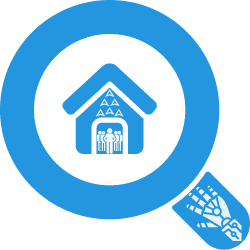Congratulations! You’re just a few steps away from getting the keys to your new home in Nevada. But before you can officially get the keys, one of the last steps is to pay closing costs.
Closing costs are the fees and expenses associated with finalizing a real estate transaction and transferring ownership of a property from the seller to the buyer. If you’re feeling unprepared or overwhelmed, don’t worry. To help you budget for closing costs, this Redfin article will cover how much closing costs are in Nevada, who pays for them, and which costs you can expect to pay as a buyer and as a seller.

How much are closing costs on average in Nevada?
In addition to the down payment, homebuyers will also need to pay closing costs before securing the keys to their new home. As a general rule of thumb, you can expect closing costs in Nevada to add up between 2%-5% of the purchase price. However, keep in mind that closing cost amounts vary depending on many factors – such as the purchase price of the home, the type of loan, and any adjustments negotiated with the seller.
For example, if you’re buying a home in Henderson, which has a median sale price of $495,000, closing costs could range anywhere from $9,900 to $24,750. Or, let’s say that you’re buying a home in Las Vegas, which has a median sale price of $440,000. Closing costs for a home here could range from $8,800 and $22,000.
Who pays closing costs in Nevada?
So, who pays for closing costs in Nevada? In most transactions, both the buyer and seller will pay closing costs. But, each party’s closing costs amount will vary depending on what they are required to pay. Keep in mind that it’s common for the buyer to pay closing costs out of pocket, while the seller’s closing costs are typically deducted from the home sale proceeds.
Buyer closing costs in Nevada
Closing costs in Nevada for buyers usually range from 2%-5%. In most cases, you’ll pay earnest money, typically 1% to 3% of the home price, upon reaching mutual acceptance in your home purchase. This deposit is subtracted from your closing costs, reducing the total amount due at closing. Let’s break down some of the common closing costs covered by the buyer:
- Appraisal fee: Home appraisals, which typically range from $300 to $500, are usually paid for separately at the time of the service. However, if not, you’ll need to pay for this at closing.
- Inspection fee: Although not required, a home inspection is highly recommended. Home inspections generally range from $300 to $500 in cost and are usually paid at the time of service. However, if not, it will need to be paid at closing.
- Loan origination fee: Most lenders charge a fee for creating your loan. Be sure to check with your lender what this fee covers and if it can be waived or negotiated.
- Loan processing fee: Lenders may also charge a loan processing fee, covering underwriting and related services. Similar to the origination fee, check with your lender to understand its purpose and possible waivers.
- Loan discount points: If you buy discount points to lower your interest rate, you’ll pay a one-time fee at closing. These points can lower your rate by 0.25% to 0.5%, but consider your long-term homeownership plans before paying for a reduced rate.
- Private mortgage insurance (PMI): Required for down payments under 20%, PMI might involve an upfront fee at closing, depending on the loan type. It’s usually part of your monthly payment, but some loans offer the option to pay it as a one-time fee.
- Title insurance: Title insurance is a one-time fee paid as part of closing costs. Buyers typically cover both lender and owner title insurance policies.
- Homeowners insurance: In Nevada, your annual homeowner’s insurance premium may be part of your closing costs.
- Homeowners Association dues: If your property is part of a homeowners association, you’ll likely pay one month’s dues upfront at closing. These fees vary and contribute to maintenance and operational costs.
- Property taxes: As part of closing costs in Nevada, you may be required to prepay a portion of your property taxes at closing.
Seller closing costs in Nevada
How much closing costs are in Nevada for sellers will vary between each transaction. Here are some of the common fees and costs covered by sellers:
- Real estate agent commission fees: These fees can be a significant cost for sellers. Commission fees may vary and are subject to negotiation. Sellers should discuss their options with their agent.
- Homeowners Association fees: If the property is part of an HOA, the seller may need to pay a variety of fees. These can include HOA transfer fees, outstanding dues, and possibly a fee for obtaining HOA documents required by the buyer. The exact fees will depend on the HOA’s rules and regulations.
- Property taxes: Sellers are responsible for any property taxes that have accrued but not yet been paid up to the closing date. These unpaid property taxes are typically prorated for the months that you owned the property.
- Title insurance: Owner’s title insurance is another common closing cost in Nevada paid for by the seller.
- Transfer taxes: In Nevada, there is a state levied tax on the transfer of ownership of a property. Sellers can expect to pay a one-time transfer tax as part of closing costs. There may also be additional taxes levied by local governments, such as counties and cities.
Median home sale price data from the Redfin Data Center during July 2024.
This post was originally published on 3rd party website mentioned in the title of this site



